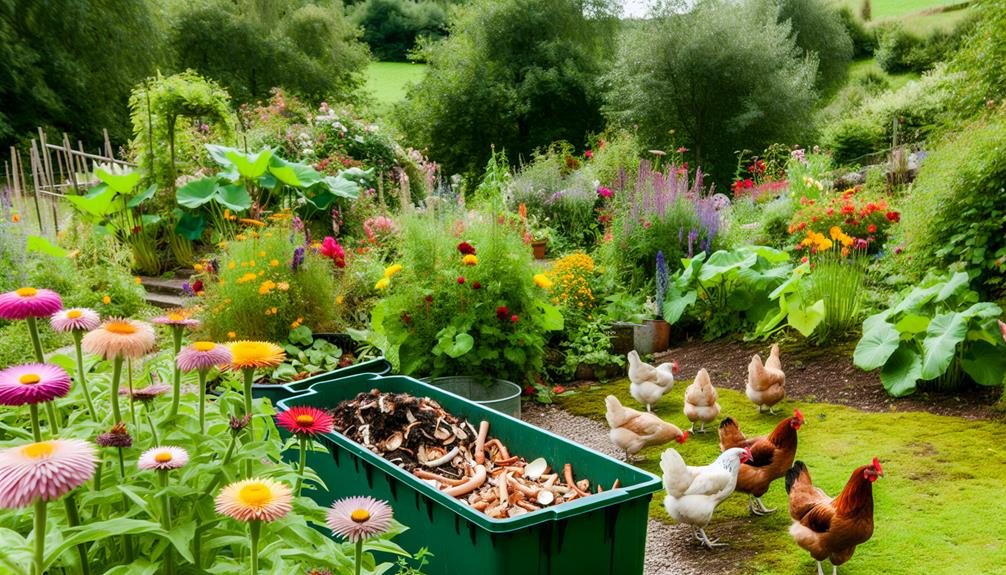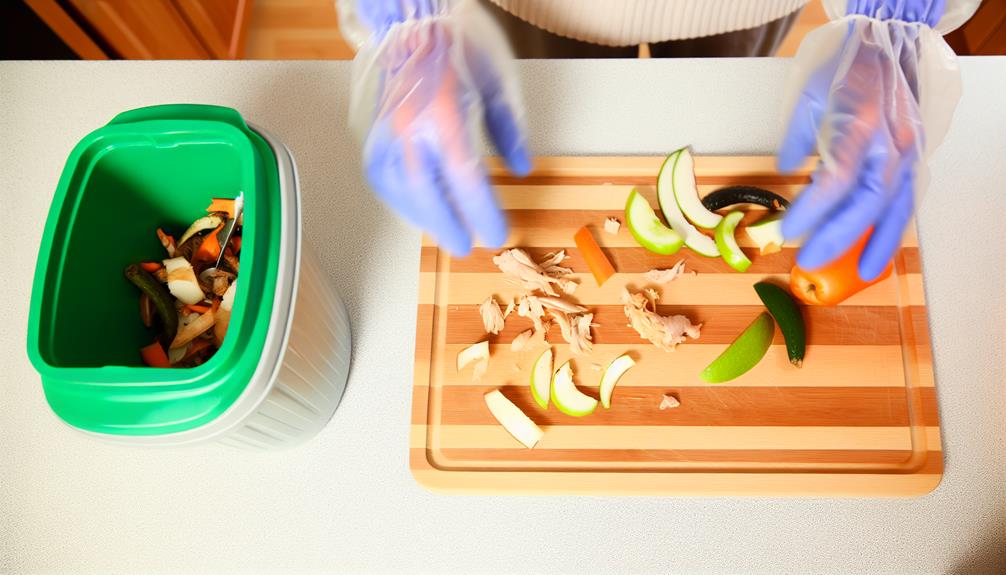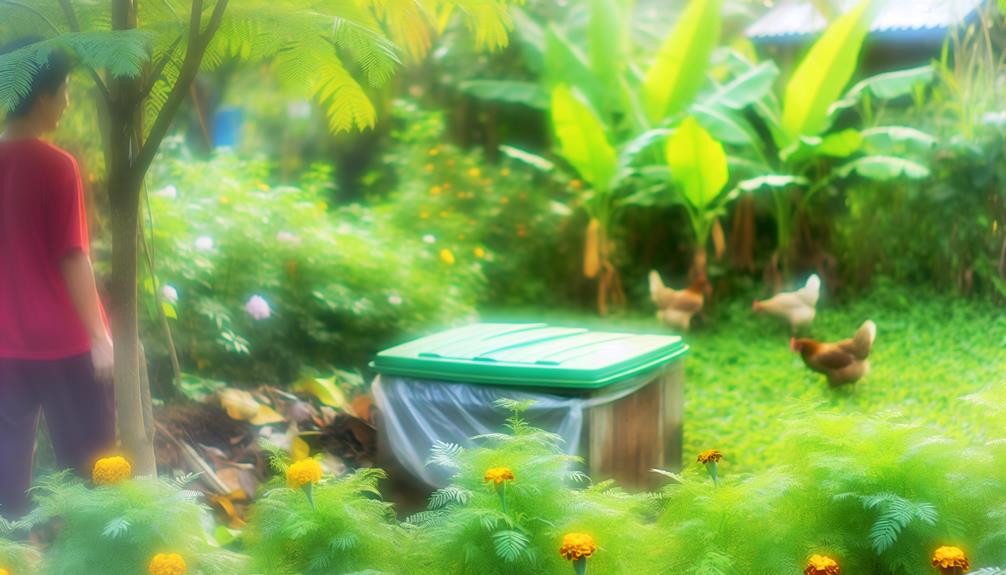

You can compost chicken, but you need to be cautious to avoid bacterial contamination, unpleasant odors, and pests. Start by cutting the chicken into small pieces, no larger than an inch. Balance the compost with green materials (like kitchen scraps) and brown materials (like dry leaves). Make sure your pile reaches high temperatures to kill pathogens.
Regularly turn and monitor the pile for proper aeration and moisture. Using a secure bin or enclosure can help keep pests away. With these steps, composting chicken can enrich your soil and benefit your garden. Learn more about composting techniques and troubleshooting to get started.
Composting chicken waste offers numerous environmental and economic benefits. By turning chicken manure into compost, you’re not just reducing waste but actively enriching the soil in your garden. This process of soil enrichment leads to healthier plants and more productive yields. Chicken manure is high in nitrogen, which is essential for plant growth. When composted properly, it breaks down into a nutrient-rich substance that your plants will love.
Nutrient recycling is another significant advantage of composting chicken waste. Instead of letting this valuable material go to waste, you can recycle it back into your garden’s ecosystem. This practice helps maintain a balanced and sustainable environment. You’re fundamentally giving back to the soil what it needs to thrive, creating a continuous loop of growth and renewal.
To compost chicken waste effectively, make sure you mix it with other organic materials like leaves, straw, or kitchen scraps. This helps balance the carbon-to-nitrogen ratio, speeding up the composting process. Turning the pile regularly and keeping it moist will further aid decomposition. By following these steps, you’ll create high-quality compost that benefits your garden and the environment.
Also Read: Can You Compost Bread?
While composting chicken waste offers numerous benefits, you should be aware of potential pitfalls that could hinder the process. One major concern is bacterial contamination. Chicken waste can harbor harmful bacteria like Salmonella and E. coli, which can spread disease if not handled properly. Managing your compost pile carefully to avoid these risks is vital.
Another issue is disease transmission. Pathogens in chicken waste can spread to other animals or even humans if the composting process doesn’t reach high enough temperatures. Ensuring your compost pile gets hot enough to kill these pathogens is important for safe composting.
Here are three potential pitfalls to watch out for:
Before starting your composting process, you need to take several preparation steps to guarantee safety and efficiency. First, secure proper chicken cleaning. Rinse the chicken thoroughly to remove any remaining blood and organic matter, which can attract pests and create unwanted odors in your compost pile.

Next, focus on the cutting techniques. Chop the chicken into smaller pieces. This increases the surface area and helps the chicken decompose faster. Aim for pieces no larger than an inch. Using a sharp knife, cut through the bones as well; this will break them down more effectively in the composting process.
Once the chicken is cleaned and chopped, make sure you have a balanced mix of green and brown materials. Chicken is a green material, rich in nitrogen, so pair it with carbon-rich brown materials like dried leaves or straw to maintain an ideal composting environment.
Also Read: Can You Compost Arugula?
When choosing how to compost chicken, you’ll find several effective methods to suit different needs and environments. Each method has its unique benefits, and selecting the right one can help you create a thriving compost system.
Also Read: Can You Compost Broad Beans?
Pests and odors can make composting chicken a challenge, but with the right strategies, you can keep both under control.
First, always cover your compost pile thoroughly. Use a mix of dry leaves, straw, or sawdust to create a thick layer over the chicken waste. This not only helps with odor control but also deters pests like flies and rodents.

For effective predator prevention, consider using a bin with a secure lid or building an enclosure with wire mesh. This keeps larger animals, such as raccoons or neighborhood pets, from digging into your compost pile. A sturdy, enclosed system will maintain the compost’s integrity and keep unwanted visitors at bay.
Another tip is to regularly turn your compost pile. This aerates the material, speeding up decomposition and reducing foul smells. Adding a balanced mix of green and brown materials also helps maintain the right composting environment, minimizing unpleasant odors.
You’re wondering if it’s safe to compost chicken bones. By practicing proper composting methods, you can minimize disease transmission. Just make sure you maintain high temperatures and turn the pile regularly. We’re all learning together!
Yes, composted chicken can attract rodents. To guarantee rodent prevention, maintain good compost hygiene by burying chicken deeply, balancing greens and browns, and using secure bins. You’ll create a rodent-free, thriving compost community.
You’re wondering about the decomposition timeline for chicken in compost, right? With proper compost layers and regular turning, it usually takes 2 to 6 months. Remember, layering helps speed up the process and minimizes odors.
Yes, you can compost cooked meat, but it’s tricky. It attracts pests and takes longer to break down. To reduce food waste, bury it deep in your compost or use a specialized composter like Bokashi.
Composting chicken can impact the compost’s nutrient balance positively. You’ll find that it offers substantial nutrient contribution and organic matter, enhancing the overall quality and fostering a sense of community among fellow composters who share similar goals.
By composting chicken, you’ll enrich your soil and reduce waste. Remember to balance your compost with carbon-rich materials like leaves or straw to avoid odors and pests.
Chop the chicken into small pieces and mix thoroughly to speed up decomposition. Use either a hot composting method for faster results or a cold composting method for less maintenance.
Follow these steps, and you’ll successfully turn chicken waste into valuable compost for your garden.
